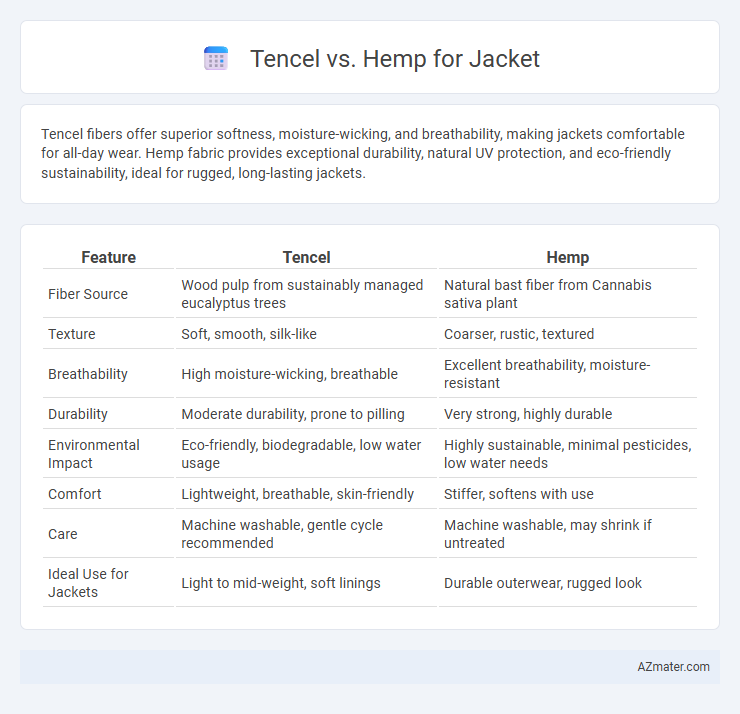Tencel fibers offer superior softness, moisture-wicking, and breathability, making jackets comfortable for all-day wear. Hemp fabric provides exceptional durability, natural UV protection, and eco-friendly sustainability, ideal for rugged, long-lasting jackets.
Table of Comparison
| Feature | Tencel | Hemp |
|---|---|---|
| Fiber Source | Wood pulp from sustainably managed eucalyptus trees | Natural bast fiber from Cannabis sativa plant |
| Texture | Soft, smooth, silk-like | Coarser, rustic, textured |
| Breathability | High moisture-wicking, breathable | Excellent breathability, moisture-resistant |
| Durability | Moderate durability, prone to pilling | Very strong, highly durable |
| Environmental Impact | Eco-friendly, biodegradable, low water usage | Highly sustainable, minimal pesticides, low water needs |
| Comfort | Lightweight, breathable, skin-friendly | Stiffer, softens with use |
| Care | Machine washable, gentle cycle recommended | Machine washable, may shrink if untreated |
| Ideal Use for Jackets | Light to mid-weight, soft linings | Durable outerwear, rugged look |
Introduction: Tencel vs Hemp for Jacket Fabric
Tencel and hemp fibers offer distinct benefits for jacket fabrics, with Tencel known for its smooth texture, moisture-wicking properties, and eco-friendly production from sustainably sourced wood pulp. Hemp fabric provides exceptional durability, natural antimicrobial qualities, and superior breathability, making it ideal for long-lasting outerwear. When choosing between Tencel and hemp for jackets, considerations include environmental impact, comfort, and fabric performance in various weather conditions.
Overview of Tencel: Features and Benefits
Tencel is a sustainable fabric made from eucalyptus wood pulp, known for its exceptional softness, breathability, and moisture-wicking properties, making it ideal for jackets that require comfort and durability. Its natural fibers are biodegradable and produced through environmentally responsible closed-loop processes, ensuring minimal waste and water usage. Tencel jackets offer excellent wrinkle resistance, temperature regulation, and enhanced durability, appealing to eco-conscious consumers seeking performance and style.
Overview of Hemp: Features and Benefits
Hemp fabric offers exceptional durability and natural resistance to wear, making it ideal for long-lasting jackets. Its breathable and moisture-wicking properties enhance comfort by regulating temperature and reducing sweat buildup. Additionally, hemp is an eco-friendly material, requiring minimal water and pesticides, supporting sustainable fashion choices.
Sustainability Comparison: Tencel vs Hemp
Tencel, derived from sustainably managed eucalyptus trees, offers a biodegradable and low-impact production process with minimal water and chemical use, making it highly eco-friendly. Hemp cultivation requires little water, grows rapidly without pesticides, and improves soil health, contributing to its strong sustainability profile. Comparing both, hemp has advantages in carbon sequestration and soil regeneration, while Tencel excels in closed-loop processing and soft fabric quality, making each material uniquely sustainable for eco-conscious jackets.
Comfort and Breathability Analysis
Tencel jackets offer superior softness and moisture-wicking properties, enhancing overall comfort during extended wear. Hemp fabrics provide excellent breathability and durability, allowing air circulation while maintaining a sturdy structure. Comparing the two, Tencel excels in smooth texture and moisture management, whereas hemp stands out for natural ventilation and long-lasting wear.
Durability and Longevity: Which Lasts Longer?
Tencel jackets offer excellent durability due to their moisture-wicking and wrinkle-resistant properties, making them resistant to wear and tear over time, while hemp jackets are renowned for their exceptional strength and resistance to stretching and abrasion, often lasting longer under heavy use. Hemp fibers have a higher tensile strength compared to Tencel, resulting in jackets that maintain shape and integrity after prolonged wear. For longevity, hemp jackets generally outperform Tencel, providing a sustainable and robust option for long-lasting outerwear.
Style and Aesthetic Considerations
Tencel jackets offer a smooth, luxurious finish with vibrant color retention, appealing to those seeking sleek and modern aesthetics. Hemp jackets feature a distinctive natural texture and matte appearance that lend an earthy, rugged charm ideal for casual or eco-conscious styles. Both fabrics provide unique stylistic elements, with Tencel favoring refined elegance and hemp emphasizing durability and organic appeal.
Care and Maintenance Requirements
Tencel jackets require gentle washing in cold water with mild detergent and should be air-dried to maintain their smooth texture and prevent shrinkage. Hemp jackets are more durable and can withstand regular machine washing, though washing in cold water and avoiding bleach helps retain fabric strength and color. Both materials benefit from minimal ironing, with Tencel needing low heat settings and hemp tolerating moderate heat to preserve fabric integrity.
Cost Comparison: Tencel vs Hemp Jackets
Tencel jackets typically come at a higher price point due to the advanced lyocell fiber production process and its eco-friendly appeal, while hemp jackets are often more budget-friendly, benefiting from the fast-growing, low-resource hemp plant. Despite the initial higher cost, Tencel offers a softer, more breathable fabric which some consumers may value over hemp's durable and rugged texture. Cost-wise, hemp jackets provide an affordable and sustainable alternative without sacrificing longevity, making them attractive in price-sensitive markets.
Final Verdict: Which is Better for Jackets?
Tencel offers unmatched breathability and moisture-wicking properties, making it ideal for lightweight, comfortable jackets suitable for active wear or warm climates. Hemp provides superior durability, natural UV resistance, and eco-friendly qualities, perfect for rugged, long-lasting outerwear in variable weather conditions. For jackets emphasizing softness and moisture management, Tencel is preferable, while hemp excels in sustainability and toughness for durable, weather-resistant apparel.

Infographic: Tencel vs Hemp for Jacket
 azmater.com
azmater.com